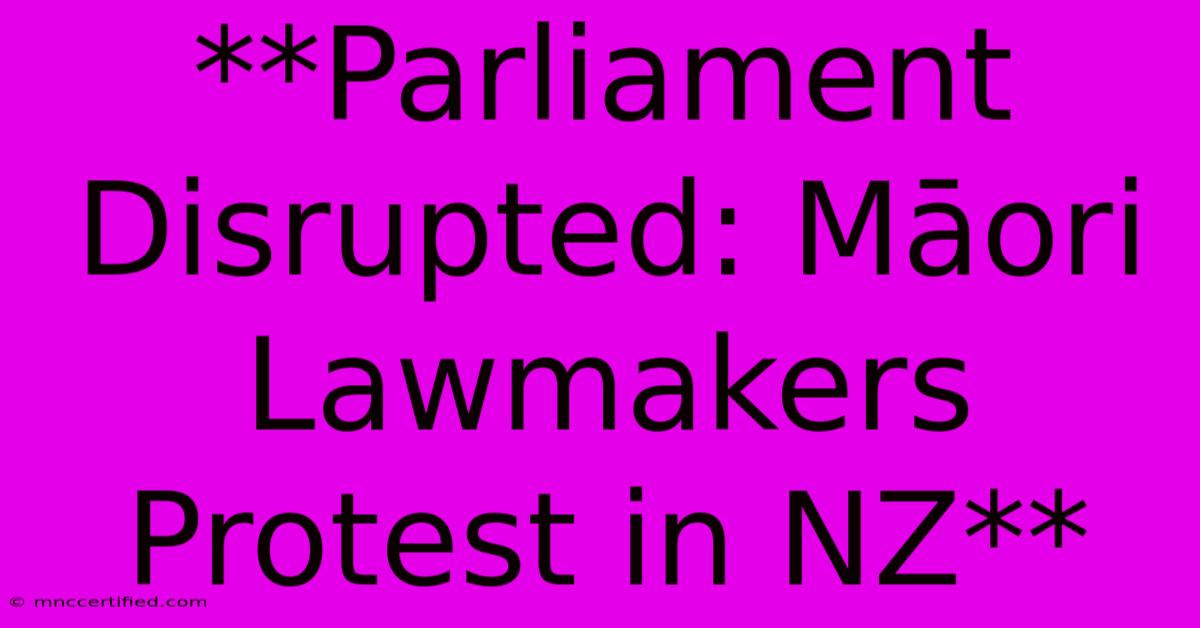**Parliament Disrupted: Māori Lawmakers Protest In NZ**

Table of Contents
Parliament Disrupted: Māori Lawmakers Protest in NZ
On [Date], New Zealand's Parliament experienced an unprecedented disruption as Māori lawmakers staged a protest, demanding greater recognition and action on issues impacting their communities. The protest, which saw [briefly describe the nature of the protest, e.g., lawmakers occupying the speaker's chair, chanting slogans, etc.], brought the legislative process to a standstill and ignited national debate on the place of Māori rights and sovereignty within New Zealand's political system.
The Roots of the Protest: A Legacy of Unfulfilled Promises
The protest stemmed from a long-standing frustration among Māori concerning the perceived lack of progress in addressing historical injustices and contemporary challenges facing their communities.
- Treaty of Waitangi: The 1840 Treaty of Waitangi, which established British sovereignty over New Zealand, promised Māori equal rights and protection of their lands and resources. However, Māori argue that the treaty has been repeatedly broken, leading to widespread land dispossession, cultural suppression, and socioeconomic disparities.
- Contemporary Issues: Despite some progress in recent years, Māori continue to face disproportionate rates of poverty, unemployment, and incarceration. They also grapple with the impacts of climate change, which disproportionately affects their communities.
Māori lawmakers argue that the current political system does not adequately reflect their unique needs and concerns. They demand:
- Full Treaty Settlement: A complete and just settlement of outstanding Treaty claims, including the return of ancestral lands and resources.
- Increased Māori Representation: Greater representation in Parliament and government institutions to ensure their voices are heard and their interests are protected.
- Co-Governance: A partnership model where Māori share decision-making power with the Crown on issues that impact their communities.
The Impact and Aftermath: A Catalyst for Change?
The protest, while disruptive, brought to the forefront the urgency of addressing Māori concerns.
- National Attention: The protest sparked widespread media coverage and public discussion, raising awareness of the historical and contemporary injustices faced by Māori.
- Government Response: The government has acknowledged the validity of Māori concerns and committed to engaging in meaningful dialogue to find solutions. However, the nature and extent of these solutions remain unclear.
- Political Divide: The protest has also exposed divisions within the political landscape, with some lawmakers supporting the Māori demands while others remain skeptical.
The future of Māori rights and representation in New Zealand remains uncertain. This protest serves as a crucial moment for the country to reckon with its colonial past and find ways to build a more inclusive and equitable future.
Keywords:
- Māori
- Parliament
- Protest
- Treaty of Waitangi
- Māori rights
- Sovereignty
- New Zealand
- Government
- Representation
- Co-governance
Further Resources:
- [Link to the official website of the Māori Parliamentarians]
- [Link to a relevant news article about the protest]
- [Link to a reputable organization working for Māori rights]
Note: Ensure that the information you provide is accurate and up-to-date. Remember to attribute your sources appropriately and avoid plagiarism.

Thank you for visiting our website wich cover about **Parliament Disrupted: Māori Lawmakers Protest In NZ**. We hope the information provided has been useful to you. Feel free to contact us if you have any questions or need further assistance. See you next time and dont miss to bookmark.
Featured Posts
-
Live England Defeats Greece Match Report
Nov 15, 2024
-
Cheap Dentist Near Me No Insurance
Nov 15, 2024
-
Matchday 5 Italy And France Nations League
Nov 15, 2024
-
Brazil Vs Venezuela Fifa World Cup 2026 Updates
Nov 15, 2024
-
Watch Uefa Nations League Greece Vs Opponent Live
Nov 15, 2024